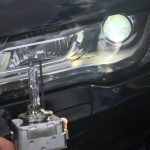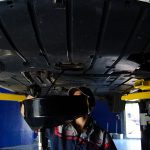How does my vehicle’s braking system work?
Basically what is important for you to know is disc brakes consist of a brake disc, a brake caliper, and a brake pad. When you press the brake pedal, hydraulic fluid is released and causes the brake caliper to press the brake pad against the brake disc. The rubbing of the brake pad against the brake disc generates friction, which allows the brake pad to slow the brake disc and wheel, ultimately bringing the vehicle to a complete stop.
The part of this system that is most vulnerable and needs constant maintenance and inspection is the brake pads, discs and fluid. The fluid can be exposed to outside elements including moisture and particles that will limit its effectiveness. The brake pad and brake disc experience are designed out of materials strong enough to absorb the heat generated by the friction needed to stop a moving vehicle, like ceramic and sintered steel. However, even with these strong materials when the brake pads grind against the brake discs both components will wear and warp over time.
Why should I change or resurface my discs every time I change my brake pads?
The brake pad will wear past its allowed wear limits and require replacement. A new brake disc has a smooth running surface, after use the surface will wear and have several groove lines, think of an old music album. Replacing the brake pad alone means that the new pad will only touch the high spots on the worn grooved brake disc, therefore minimizing the surface area used to grind and generate enough friction to stop the vehicle.
Brake pads and discs were not designed to be replaced seperately, doing so will cause your new brake pad to wear unnecessarily fast and possibly increase your car’s stopping distance. For your safety, Ürolube technicians will never recommend changing brake pads without disc resurfacing or disc replacement.
How do I know if I can just resurface instead of replacing my brake discs?
Brake discs have specific wear limits and thickness requirements, generally if the discs are thick enough they can just be ground to recreate a smooth flat surface. Just ask your mechanic whether your brake discs are past their wear limits or if they can be ground or resurfaced.
A simplified youtube video of this process can be seen here:






